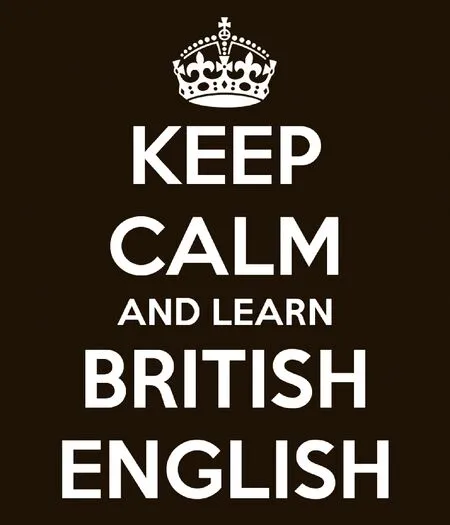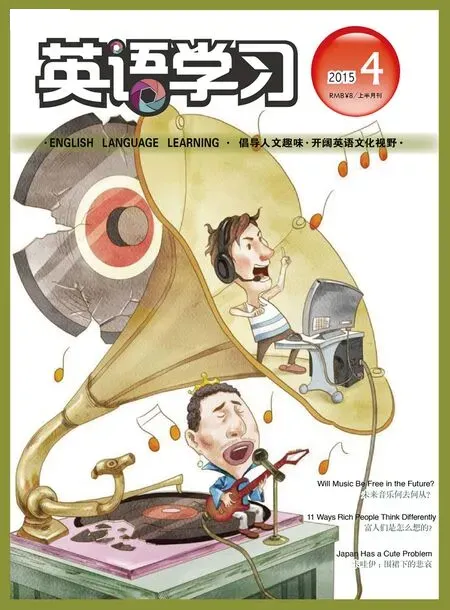If You Want to Talk like the Briti
Sylvia Yang

As British accent1. accent: 口音。makes the speaker sound like a lady or a gentleman, many people want to learn how to talk like the British. However, compared with American English, British accent is supposed to be harder to acquire. According to my personal experiences, it is true that talking like a native speaker can be hardly achieved, but some typical British English expressions can be easily learnt. In this article, I’m going to introduce some of those expressions I’ve encountered2. encounter: 遇到。in the UK.
If you want to talk like the British, say “Cheers.” rather than “Thanks” in informal conversations. Before I came to the UK, I only knew the meaning of “cheer” as “to make someone happy or excited” as in the phrase “cheer up”. After I came to the UK for the first time, I noticed that they used“Cheers” much more often than “Thanks”. For example, in the UK, there’s usually only one door for getting on and off the bus. When people get off the bus, they would say “Cheers” with a strong British accent to thank the driver. Apart from that, my British flatmate also said “Cheers” to me when she asked me to pass something to her when we were cooking together.“Cheers” are casually used by British people in daily informal conversations for small favours, such as opening doors for you, lending you a pen or giving you receipts. It is not as formal as “Thanks” or “Thank you”, but it’s used in a rather high frequency3. frequency: 频率。in daily conversations.
If you’ve read the original English edition of Jane Austin’s work, you may get a glimpse of how polite the British can be even when they are talking to their relatives and friends.4. Jane Austin: 简·奥斯汀(1775—1817),英国著名女性小说家,代表作《傲慢与偏见》;a glimpse of:一瞥。Although it could be too dramatic and weird to talk like the ladies and gentlemen in Jane Austin’s work, the politeness and gentility are still appreciated in modern British English.5. 虽然像简·奥斯汀作品中的淑女和绅士那样说话会让人觉得太夸张,有些怪怪的,但在现代的英式英语中,人们依然很欣赏有礼貌、文雅的说话方式。weird: 古怪的;gentility: 有教养,文雅;appreciate: 欣赏。If one bumps onto6. bump onto: 撞到。or steps on others in a crowded bus or on the street accidentally, they would immediately say “Sorry”. Besides, “Excuse me”is also used a lot when one needs to interrupt7. interrupt: 打断(谈话)。others, even including calling the waitress. “Could/Would you please…” is another common expression in British English to express requests or suggestions. When the cashiers ask the customer to sign on the receipt, they would say “Could you please sign your name here?”
正所谓学习的最高境界是学什么像什么。至于语言学习,恐怕其最高境界是你一开口,就能让人误把你当作native speaker。试问一下,你现在做到了吗?如果做到了,那么恭喜你,语言学习得很到位;如果没做到,也不用担心,这里其实有很多小技巧呢!
If you want to talk like the British, use present perfect tense more in the case where you normally use simple past tense.8. 如果你想像英国人那样说话,你就在通常使用一般过去时的地方,多用些现在完成时。It is quite common to hear the British say “Have you done your work?” rather than “Did you do your work?” British people tend to use present perfect tense much more than simple past tense. When British people want to express possession9. possession: 拥有。,they would usually use “Have you got a new car?” rather than “Did you buy a new car?” Similarly, they frequently use “Have you got a cold?”to express sickness instead of “Did you get a cold?” Comparatively10. comparatively: 相比较而言。,the use of present perfect tense is limited in American English, because Americans normally use the simple past tense on the same occasion.
Chinese sometimes ask “Did you have your dinner?” as a kind of greeting. In fact, speakers may merely want to show his/her kindness and have no intention to ask whether you had dinner or not.11. merely: 仅仅;intention:意向。English also has some similar expressions. Chinese students were taught at school that when a customer went to a store, shop assistants would ask “What can I do for you?” However, I never heard the exact same expression when I was in the UK. Except for some luxury stores, no sales assistants would greet and follow customers around as those in China. Only when customers ask for help or look like lost will sales assistants come up to ask “Are you all right?” It seems that they are providing help,but my British friends told me customers would normally respond “Yeah, thanks.” unless they were really seeking for help. Interestingly, when I heard “Are you all right?” for the first time, I was confused and didn’t know how to answer it and even explained that I was just looking around and I didn’t need help. How embarrassing12. embarrassing: 令人尴尬的。it was!

If you want to talk like a British, use British English expressions rather than American ones. In the UK, the first floor is in fact the second floor in terms of Chinese concept.How do the British call the first floor? They use “ground floor”. Consequently, “ first floor” is actually the second floor.In addition, you don’t need to worry about some expressions which look quite similar. When I firstly learnt “elevator” and“escalator”, I was always confused about which word is the one that goes up and down vertically.13. elevator:〈美〉电梯;escalator: 自动扶梯;vertically: 垂直地。It seems no problem for British people, because they use “lift” for “elevator”. And the British use “tube/underground” for “subway”. “Trousers” is a kind of outwear while “pants” refers to underwear.14. outwear: 外套;underwear: 内衣物。There’re quite a few particular British English expressions.
Although some tricks can be found to talk like the British, I have to confess it’s never effortless to acquire British English in a day or a week.15. 尽管找到这些窍门能让你说起话来像英国人,但我也不得不承认,学习英式英语并不简单,绝非一日或一周内就能掌握。trick: 窍门;confess: 承认,坦白。If you really want to talk like a British, you’d better come down-to-earth16. down-to-earth: 脚踏实地的。. Rome cannot be built in one day,while British English cannot be acquired in a short time.

